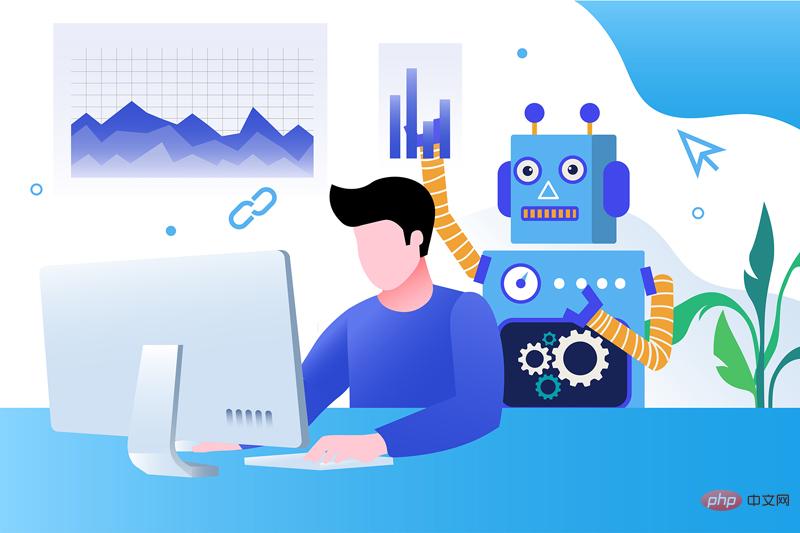92 Amazing Artificial Intelligence Statistics and Facts for 2022

Here are some facts and statistics we should know.
Interesting and Surprising Artificial Intelligence Statistics and Facts
1, As one of the fastest growing technologies in the world, Artificial Intelligence is expected to have a market share by 2027 The scale will reach 270 billion US dollars.
2. By 2030, it is expected to reach 15.7 trillion US dollars.
3, 77% of people take advantage of the artificial intelligence capabilities of machines in one form or another, although only 33% are aware that they are doing so.
4. Artificial intelligence technology in the workplace will grow from 10% in 2015 to 37% in 2021.
5, The use of artificial intelligence has increased significantly during the COVID-19 pandemic. AI applications grew by 37% in the financial industry, 27% in the retail industry, and 20% in the IT industry.
6, 83% of companies say developing and deploying artificial intelligence algorithms is critical to their strategic priorities.
Statistics on the application of artificial intelligence in various industries
7, Artificial intelligence is currently used in business analysis (33%), security (25%), and sales and marketing ( 16%). However, 40% of companies claim that the biggest motivation for adopting new technologies is to simplify customer experience.
8, 54% of companies using artificial intelligence claim that their productivity has improved. However, 80% of business leaders see the potential to improve productivity.
9, 44% of companies that have implemented artificial intelligence technology also said that their operating costs have been reduced.
10, In the customer service industry, artificial intelligence can reduce call time by 70%, thereby saving 40% to 60% of costs.
11. Implementing artificial intelligence in the sales department can increase potential customers by more than 50%.
12, 28% of companies use artificial intelligence for marketing purposes. However, 84% of marketers believe artificial intelligence is more important than any other technology.
13. By 2025, the agricultural robot industry is expected to reach US$20.6 billion. Of that amount, $6.2 billion will be spent on unmanned aerial vehicles (UAVs).
14, It is estimated that by 2024, the application value of artificial intelligence in the education system is expected to reach US$6 billion.
15. 80% of retail companies believe that artificial intelligence will be used in some form by 2027.
16. It is predicted that artificial intelligence robots can handle most tasks and interactions in the banking industry with 90% accuracy.
17, 51% of European manufacturers, 30% of Japanese manufacturers and 28% of US manufacturers have integrated artificial intelligence into their operations.
18, U.S. manufacturers that have deployed artificial intelligence technology reported a 12% increase in production.

Facts about artificial intelligence and wearable devices
19, The wearable AI market is expected to reach 1800 by 2025 One hundred million U.S. dollars.
20, It is expected that by 2027, smart watch wearable AI applications alone will reach US$96.31 billion, an increase of 19.6% from 2020.
21, By 2025, the United States is likely to control the largest wearable technology market share (35%), followed by Latin America (20%).
22, It is expected that by the end of 2022, the sales volume of smart wearable devices will exceed 780 million units.
23, The artificial intelligence technology used in wearable devices themselves is also constantly developing. In 2013, the average wearable device had 1.4 sensors. Now it has grown to 4.1.
24, The use of artificial intelligence in fitness wearables may also increase significantly. It is expected to generate revenue of US$14.64 billion by 2027.
25, 92.1% of industry leaders believe that by 2025, 10% of the population will own smart clothing.
Artificial intelligence and self-driving car statistics
26, There are currently 25 countries developing self-driving cars.
27, In 2021, the global autonomous vehicle industry will be worth more than US$54 billion.
28, The autonomous vehicle industry is growing at an annual rate of 36%. By 2030, there may be more than 800,000 cars on the road.
29, It is expected that by 2040, China will become the largest market for autonomous vehicles, and its driving mileage will account for 66% of the world's total.
30, 35% of Americans claim they will never use a self-driving car, but another 67% say self-driving cars are safer than human drivers.
31, 87% of people believe that self-driving cars would be safer if they had a human driver to take over when needed.
32, Self-driving cars can reduce taxi waiting time by 88%.
33, By 2050, the autonomous vehicle industry can reduce road traffic accidents by nearly 90%.
Facts about artificial intelligence and robots
34, In 2020, the number of robots in the world was 12 million.
35, 42% of robots are used in the automotive industry.
36, By 2025, the industrial robot industry may reach US$33.8 billion, an increase of 61% from 2016.
37, By 2025, 35% of industrial robots sold will be collaborative and can work alongside human employees.
38, China is expected to occupy the highest share of the robot market (22.1%), followed by the United States (20.4%).
39, The life and pharmaceutical industry is one of the highest adopters of robotics, growing by 70% from 2020 to 2021.
40, Every time Amazon opens a warehouse where Kiva collaborative robots are deployed, it can save approximately US$22 million.
Facts About Chatbots and Artificial Intelligence
41, It is expected that by 2022, the use of deep learning chatbots will increase by 15% compared to 2018.
42, It is expected that by 2022, chatbots will be used in 70% of customer interactions.
43, 52% of phone companies currently use chatbots to interact with customers.
44, 27% of customers said they would rather talk to a humanoid robot than a real-life customer service representative.
45, The three biggest benefits of using a chatbot system are 24-hour service (66%), instant response (55%) and the ability to answer simple questions (55%).
46, Forecasts show that chatbots can save $8 billion globally every year.
Voice Search and Artificial Intelligence Statistics
47, There are more than 110 digital voice and virtual assistants in the United States alone. 53 million of them are Amazon Echo devices, accounting for 30% of the voice assistant market. Google Assistant has 17% market share.
48, 55% of customers said that the biggest reason for using voice recognition AI tools is that they can control devices hands-free.
49, By 2024, it is expected that 8.4 billion assistants will be used on different devices, which is more than the total population of the world today.
50, Google Assistant is the most accurate voice assistant with an accuracy rate of 98%. Amazon Alexa is 93%, while Apple Siri is only 68%.
51, Only 54% of customers believe that digital voice assistants can accurately understand their voices.
52, Amazon Alexa has more than 66,000 skills and is the most powerful of all voice assistants.
Network Security of Artificial Intelligence Statistics
53, By 2027, the artificial intelligence cybersecurity industry will reach US$46.3 billion, an increase of 23.6% from 2020.
54, Every 39 seconds, a network data attack occurs online, and approximately 300,000 pieces of malware are detected every day.
55, In 2021, nearly 65% of companies around the world will be attacked by network data. However, only 12% of enterprises have installed AI-based security analytics.
56, 61% of companies said that without the help of artificial intelligence, it would be impossible to detect data security breaches. 80% of them are telecommunications companies.
57, Compared with other countries, artificial intelligence-based data network security is 15% more important to American companies.
58, 64% of enterprises believe that deploying artificial intelligence-based cybersecurity will reduce the cost and time of detecting potential threats in data.
59, 52% of customers expressed doubts about data privacy when using artificial intelligence.
60, About 300 billion emails are sent every day. Machine learning algorithms detected that at least half of the data was spam.
61, With the help of artificial intelligence, plagiarized codes in the data can be detected with 87% accuracy.

Artificial Intelligence Statistics About Healthcare
62, 38% of healthcare companies use artificial intelligence to help with medical diagnosis.
63, In 2020, more than 100 different artificial intelligence-developed devices were approved for medical use. The most common fields are radiology, cardiology, and hematology.
64, In 2020, the use of medical surgical robots exceeded US$4.6 billion. By 2027, this number is likely to grow by another 17.4%.
65, Stanford University has developed a machine learning algorithm that can predict the death of hospital patients with an accuracy of up to 90%.
66, It is expected that by 2027, the healthcare field will become the largest field of intelligent machines for artificial intelligence research and use.
67, It is predicted that by 2022, the success rate of healthcare machines that can operate without human assistance will reach 75%.
68, By 2026, artificial intelligence has the potential to save the clinical healthcare industry more than $150 billion.
The Impact of Artificial Intelligence on Employment and Job Market Statistics
69, It is predicted that by 2025, 85 million jobs (16% of the U.S. labor force) will be replaced by artificial intelligence technology.
70, Employees in the United States have the highest risk of unemployment (38%), followed by Germany (35%) and the United Kingdom (30%).
71, Workers in industries such as administration, food preparation, construction, manufacturing, cleaning and driving are most likely to lose their jobs.
72, Artificial intelligence can create up to 58 million jobs in the U.S. market, especially for data science engineers, content managers, and artificial intelligence automation experts.
73, Currently, 150,000 people are engaged in engineering and assembly jobs in different robotics and artificial intelligence industries.
74, From 2012 to 2021, data scientist positions on LinkedIn increased by 650%.
75, 79% of business executives believe that artificial intelligence can simplify their workload and improve work efficiency in the long run.
Artificial Intelligence Fun Facts
76, Artificial intelligence can predict COVID-19 death statistics with an accuracy of 92%.
77, Google and Oxford Research recently released a deep learning artificial intelligence system whose ability to read lips is better than the 12.4% of the human brain, with an accuracy of 4.8%.
78, Netflix implemented machine learning through its personalized Netflix recommendation engine, saving more than $1 billion.
79, In 2021, cashier-less Amazon Go stores achieved $4.5 billion in revenue, approximately 50% higher than ordinary convenience stores.
80, Animal welfare researcher Dr. Jean-Loup Rault predicts that by 2025, people will have robot pets.
81, If artificial intelligence is used in developing countries, it will have the potential to double the country’s economic growth by 2035.
Statistics on the adoption of artificial intelligence
82, 91.5% of leading companies, including Google, General Motors, Pfizer and CVS Health in the United States, have invested in artificial intelligence technology.
83, 54% of artificial intelligence startups are located in the United States. 15% of startups are located in China.
84, In 2018, the three most famous artificial intelligence investors in China were China SenseTime Technology (USD 1.2 billion), UBO Technology (USD 820 million) and Megvii Technology (USD 820 million). 600 million US dollars).
85, For companies, the biggest reason for not adopting artificial intelligence is the lack of employee skills (56%). Followed by fear of the unknown (42%) and not being able to find a starting point (26%).
86, CEOs are also concerned that AI automation will disrupt business practices (77%).
87, By 2030, 45% of artificial intelligence adoption will come from product improvements to existing technologies.
88, In the second quarter of 2019, startups received a total of US$7.4 billion in artificial intelligence investment and funding.
89, China is expected to gain the most significant economic benefits from artificial intelligence technology, with GDP growing by 26% by 2030. The United States may come in second.
90, In 2020 alone, Facebook, Apple, Microsoft, Google, and Amazon acquired 13 different artificial intelligence startups.
91, 84% of companies said that having deep learning AI solutions will give them a strategic competitive advantage over other companies in the same industry.
92, 75% of executives believe that their companies will fail if they do not implement artificial intelligence or machine learning.

Business executives, warehouse workers, or even just smartphone users can see the impact of artificial intelligence on our daily lives. As this smart technology continues to evolve, it is undeniable that it will have a lasting impact on our world.
The above is the detailed content of 92 Amazing Artificial Intelligence Statistics and Facts for 2022. For more information, please follow other related articles on the PHP Chinese website!

Hot AI Tools

Undresser.AI Undress
AI-powered app for creating realistic nude photos

AI Clothes Remover
Online AI tool for removing clothes from photos.

Undress AI Tool
Undress images for free

Clothoff.io
AI clothes remover

AI Hentai Generator
Generate AI Hentai for free.

Hot Article

Hot Tools

Notepad++7.3.1
Easy-to-use and free code editor

SublimeText3 Chinese version
Chinese version, very easy to use

Zend Studio 13.0.1
Powerful PHP integrated development environment

Dreamweaver CS6
Visual web development tools

SublimeText3 Mac version
God-level code editing software (SublimeText3)

Hot Topics
 1381
1381
 52
52
 Bytedance Cutting launches SVIP super membership: 499 yuan for continuous annual subscription, providing a variety of AI functions
Jun 28, 2024 am 03:51 AM
Bytedance Cutting launches SVIP super membership: 499 yuan for continuous annual subscription, providing a variety of AI functions
Jun 28, 2024 am 03:51 AM
This site reported on June 27 that Jianying is a video editing software developed by FaceMeng Technology, a subsidiary of ByteDance. It relies on the Douyin platform and basically produces short video content for users of the platform. It is compatible with iOS, Android, and Windows. , MacOS and other operating systems. Jianying officially announced the upgrade of its membership system and launched a new SVIP, which includes a variety of AI black technologies, such as intelligent translation, intelligent highlighting, intelligent packaging, digital human synthesis, etc. In terms of price, the monthly fee for clipping SVIP is 79 yuan, the annual fee is 599 yuan (note on this site: equivalent to 49.9 yuan per month), the continuous monthly subscription is 59 yuan per month, and the continuous annual subscription is 499 yuan per year (equivalent to 41.6 yuan per month) . In addition, the cut official also stated that in order to improve the user experience, those who have subscribed to the original VIP
 Context-augmented AI coding assistant using Rag and Sem-Rag
Jun 10, 2024 am 11:08 AM
Context-augmented AI coding assistant using Rag and Sem-Rag
Jun 10, 2024 am 11:08 AM
Improve developer productivity, efficiency, and accuracy by incorporating retrieval-enhanced generation and semantic memory into AI coding assistants. Translated from EnhancingAICodingAssistantswithContextUsingRAGandSEM-RAG, author JanakiramMSV. While basic AI programming assistants are naturally helpful, they often fail to provide the most relevant and correct code suggestions because they rely on a general understanding of the software language and the most common patterns of writing software. The code generated by these coding assistants is suitable for solving the problems they are responsible for solving, but often does not conform to the coding standards, conventions and styles of the individual teams. This often results in suggestions that need to be modified or refined in order for the code to be accepted into the application
 Can fine-tuning really allow LLM to learn new things: introducing new knowledge may make the model produce more hallucinations
Jun 11, 2024 pm 03:57 PM
Can fine-tuning really allow LLM to learn new things: introducing new knowledge may make the model produce more hallucinations
Jun 11, 2024 pm 03:57 PM
Large Language Models (LLMs) are trained on huge text databases, where they acquire large amounts of real-world knowledge. This knowledge is embedded into their parameters and can then be used when needed. The knowledge of these models is "reified" at the end of training. At the end of pre-training, the model actually stops learning. Align or fine-tune the model to learn how to leverage this knowledge and respond more naturally to user questions. But sometimes model knowledge is not enough, and although the model can access external content through RAG, it is considered beneficial to adapt the model to new domains through fine-tuning. This fine-tuning is performed using input from human annotators or other LLM creations, where the model encounters additional real-world knowledge and integrates it
 Seven Cool GenAI & LLM Technical Interview Questions
Jun 07, 2024 am 10:06 AM
Seven Cool GenAI & LLM Technical Interview Questions
Jun 07, 2024 am 10:06 AM
To learn more about AIGC, please visit: 51CTOAI.x Community https://www.51cto.com/aigc/Translator|Jingyan Reviewer|Chonglou is different from the traditional question bank that can be seen everywhere on the Internet. These questions It requires thinking outside the box. Large Language Models (LLMs) are increasingly important in the fields of data science, generative artificial intelligence (GenAI), and artificial intelligence. These complex algorithms enhance human skills and drive efficiency and innovation in many industries, becoming the key for companies to remain competitive. LLM has a wide range of applications. It can be used in fields such as natural language processing, text generation, speech recognition and recommendation systems. By learning from large amounts of data, LLM is able to generate text
 Five schools of machine learning you don't know about
Jun 05, 2024 pm 08:51 PM
Five schools of machine learning you don't know about
Jun 05, 2024 pm 08:51 PM
Machine learning is an important branch of artificial intelligence that gives computers the ability to learn from data and improve their capabilities without being explicitly programmed. Machine learning has a wide range of applications in various fields, from image recognition and natural language processing to recommendation systems and fraud detection, and it is changing the way we live. There are many different methods and theories in the field of machine learning, among which the five most influential methods are called the "Five Schools of Machine Learning". The five major schools are the symbolic school, the connectionist school, the evolutionary school, the Bayesian school and the analogy school. 1. Symbolism, also known as symbolism, emphasizes the use of symbols for logical reasoning and expression of knowledge. This school of thought believes that learning is a process of reverse deduction, through existing
 To provide a new scientific and complex question answering benchmark and evaluation system for large models, UNSW, Argonne, University of Chicago and other institutions jointly launched the SciQAG framework
Jul 25, 2024 am 06:42 AM
To provide a new scientific and complex question answering benchmark and evaluation system for large models, UNSW, Argonne, University of Chicago and other institutions jointly launched the SciQAG framework
Jul 25, 2024 am 06:42 AM
Editor |ScienceAI Question Answering (QA) data set plays a vital role in promoting natural language processing (NLP) research. High-quality QA data sets can not only be used to fine-tune models, but also effectively evaluate the capabilities of large language models (LLM), especially the ability to understand and reason about scientific knowledge. Although there are currently many scientific QA data sets covering medicine, chemistry, biology and other fields, these data sets still have some shortcomings. First, the data form is relatively simple, most of which are multiple-choice questions. They are easy to evaluate, but limit the model's answer selection range and cannot fully test the model's ability to answer scientific questions. In contrast, open-ended Q&A
 SOTA performance, Xiamen multi-modal protein-ligand affinity prediction AI method, combines molecular surface information for the first time
Jul 17, 2024 pm 06:37 PM
SOTA performance, Xiamen multi-modal protein-ligand affinity prediction AI method, combines molecular surface information for the first time
Jul 17, 2024 pm 06:37 PM
Editor | KX In the field of drug research and development, accurately and effectively predicting the binding affinity of proteins and ligands is crucial for drug screening and optimization. However, current studies do not take into account the important role of molecular surface information in protein-ligand interactions. Based on this, researchers from Xiamen University proposed a novel multi-modal feature extraction (MFE) framework, which for the first time combines information on protein surface, 3D structure and sequence, and uses a cross-attention mechanism to compare different modalities. feature alignment. Experimental results demonstrate that this method achieves state-of-the-art performance in predicting protein-ligand binding affinities. Furthermore, ablation studies demonstrate the effectiveness and necessity of protein surface information and multimodal feature alignment within this framework. Related research begins with "S
 SK Hynix will display new AI-related products on August 6: 12-layer HBM3E, 321-high NAND, etc.
Aug 01, 2024 pm 09:40 PM
SK Hynix will display new AI-related products on August 6: 12-layer HBM3E, 321-high NAND, etc.
Aug 01, 2024 pm 09:40 PM
According to news from this site on August 1, SK Hynix released a blog post today (August 1), announcing that it will attend the Global Semiconductor Memory Summit FMS2024 to be held in Santa Clara, California, USA from August 6 to 8, showcasing many new technologies. generation product. Introduction to the Future Memory and Storage Summit (FutureMemoryandStorage), formerly the Flash Memory Summit (FlashMemorySummit) mainly for NAND suppliers, in the context of increasing attention to artificial intelligence technology, this year was renamed the Future Memory and Storage Summit (FutureMemoryandStorage) to invite DRAM and storage vendors and many more players. New product SK hynix launched last year




